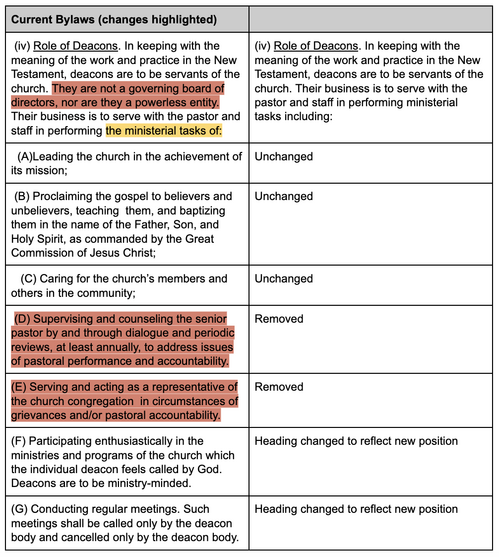Originally Presented October 19, 2025, at a Regular Business Meeting
Updated November 9, 2025.
Proposed on January 18, 2026, at a Regular Business Meeting
Updated November 9, 2025.
Proposed on January 18, 2026, at a Regular Business Meeting
Proposed By-Law Amendments
With explainations

Explainations:
(iv) Role of Deacons
Nowhere in the New Testament are deacons referred to as a governing body or powerful entity (outside of potentially having oversight of the physical-needs ministries they were a part of (depending on the interpretation of Acts 6 and other passages where the office of deacon may be in mind). Therefore, the statement "They are not a governing board of directors, nor or they a powerless entity." has been removed.
The language around the business of the deacon has been left more open-ended than just the specific tasks/functions listed out in the bylaws. Deacons are servants who take care of physical ministry needs as they arise, so language has been extended to be inclusive of other tasks/functions/needs.
The language around the business of the deacon has been left more open-ended than just the specific tasks/functions listed out in the bylaws. Deacons are servants who take care of physical ministry needs as they arise, so language has been extended to be inclusive of other tasks/functions/needs.
(D) Supervising and counseling the senior pastor...
God has not instructed deacons to supervise, review, or have any authority over any pastor anywhere in scripture. This function has been removed.
(E) Serving and acting as a representative of the church...
God has given us a prescribed method of dealing with circumstances or grievances and accountability in scripture.
As in Matthew 18, anyone who wishes to address an issue of accountability (in this case, sin) is commanded by God to go to the offender (in this case the pastor) and address that sin in order to hold the other party accountable and pursue repentance and reconciliation. In the event more is needed, the person is commanded to "take one or two others along with [them]" (Mt 18:16) in order that the charge may be evidenced by two or three witnesses. Deacons are not excluded from the potential "others," but they are not called out specifically either. Lastly, the charge must be brought before the entire church.
The pattern for dealing with grievance and accountability in the Kingdom of God is for both parties to deal with it personally in relationship. There is no provision in the New Testament for deacons to act as representatives of the congregation in matters of grievance or accountability and so the section has been removed.
As in Matthew 18, anyone who wishes to address an issue of accountability (in this case, sin) is commanded by God to go to the offender (in this case the pastor) and address that sin in order to hold the other party accountable and pursue repentance and reconciliation. In the event more is needed, the person is commanded to "take one or two others along with [them]" (Mt 18:16) in order that the charge may be evidenced by two or three witnesses. Deacons are not excluded from the potential "others," but they are not called out specifically either. Lastly, the charge must be brought before the entire church.
The pattern for dealing with grievance and accountability in the Kingdom of God is for both parties to deal with it personally in relationship. There is no provision in the New Testament for deacons to act as representatives of the congregation in matters of grievance or accountability and so the section has been removed.
